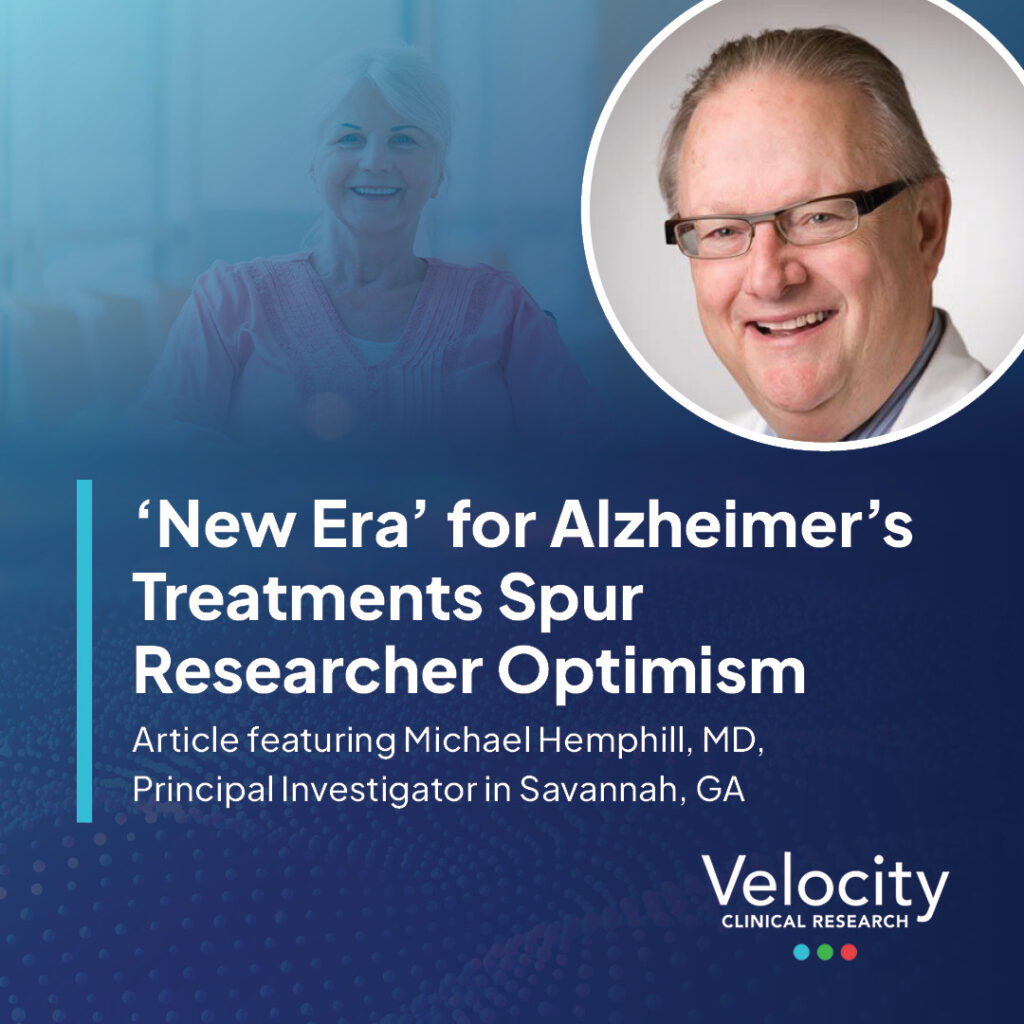After battling on the frontline for many years against an aggressive and elusive opponent, Michael Hemphill, MD and the Velocity team in Savannah, GA, believe we’ve entered an exciting “new era” in the fight against Alzheimer’s disease and dementia. Velocity conducts clinical trials related to disorders of the nervous system in Savannah as an embedded research site within Savannah Neurology Specialists’ practice.
It couldn’t have come at a better time. Alzheimer’s, a brain disorder that slowly destroys memory and, eventually, the ability to carry out even the most simple and basic life tasks is currently ranked as the seventh leading cause of death in the United States and is the most common cause of dementia among older adults.
“We’re making progress and there’s every reason to hope” treatments just hitting the market or in the pipeline will help medical professionals alter the course of the disease, Dr. Hemphill said, likening the breakthroughs against memory loss today to leaps forward against other neuro-related disorders, like Multiple Sclerosis in the 1990s and Parkinson’s in the late 1960s.
“For the first time, we have treatments that alter the course of the disease” and can mitigate its devastating effects, if caught early, he said. The most promising treatments identify and help to remove protein build-ups in the brain that are often early hallmarks of Alzheimer’s, Dr. Hemphill explains. “We want to be able to catch Alzheimer’s decades before symptoms appear, because treatments are far more effective before the disease has progressed,” he says.
As a practicing physician for more than forty years, Dr. Hemphill has dedicated much of his professional life to finding treatments and cures for debilitating neurological disorders. “I like to be part of new treatments, and to go where the new treatments are, and that means research and being a principal investigator in clinical trials,” he says.
The ‘new era’ in Alzheimer’s treatment is already “stimulating lots of research and development” in the field, he says. Dr. Hemphill is especially excited about a relatively new project called the Georgia Memory Net (GMN), a consortium dedicated to providing Primary Care Providers with the resources they need to get fast, accurate diagnoses for their patients who exhibit signs of memory loss or cognitive impairment. It provides planning and connection to community services to support Primary Care Providers in the ongoing care of their patients.
Dr. Hemphill sees patients at Savannah Neurology Specialists, which was recently designated as a Memory Assessment Clinic by GMN. The clinic is part of Velocity Clinical Research’s network of embedded sites. Velocity staffs and operates the research site, while practice physicians oversee the research for nervous system disorders. This embedded research model offers existing clinic patients the chance to take part in research as a care option, whilst helping to recruit participants from challenging therapeutic areas, like Alzheimer’s for example.
“We launched [our facility] in June and are now hiring clinical staff,” Dr. Hemphill says, excited about how the GMN can advance proactive care and treatments for patients before Alzheimer’s holds them more firmly in its debilitating grip.
Reminded that September 21st is International Alzheimer’s Day, Dr. Hemphill responds, “every day is Alzheimer’s day, as far as I’m concerned, [and] I’m absolutely optimistic” about the breakthroughs to come in the fight against a destructive health adversary.
Velocity conducts memory-loss studies at several locations across the U.S. If you would like to take part in an Alzheimer’s study with Velocity Clinical Research, please visit our Alzheimer’s research page. To learn more about our current clinical trials, visit VelocityClinicalTrials.com.
Further Reading
- Velocity Syracuse Team Advances Important Alzheimer’s Trials | Velocity Clinical Research
- Alzheimer’s Disease Fact Sheet | National Institute on Aging (nih.gov)
- World Alzheimer’s Day | Alzheimer’s Society (alzheimers.org.uk)
- Georgia Memory Net – Georgia Memory Net Georgia Memory Care – Home (gamemorynet.org)

